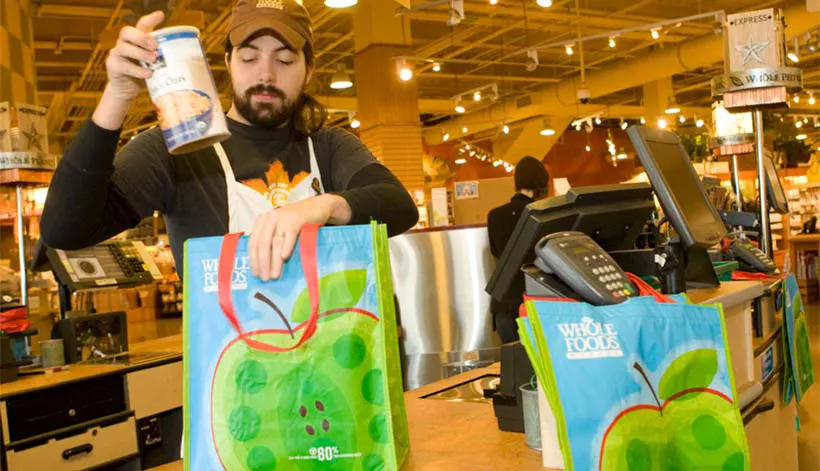Why Should You Replace Plastic Bags with Reusable Grocery Bags

Single-use plastic bags offer a certain level of convenience, but there are so many benefits to investing in a set of your local stores custom reusable grocery bags when you go shopping. From cost savings at the check-out to conserving resources and helping marine life, switching to reusable bags can make a big difference.
Reusable Grocery Bags Cost less than Disposable Bags
Many people think plastic bags are free because they are handed out at stores. The retailer factors in the cost of the bags in their prices, so as a consumer you are paying for disposable bags – it just does not appear as a line item on the receipt.
As a matter of fact, you’re probably paying for single-use plastic bags twice. The second time you pay for single-use plastic bags is by way of taxes and cleanup costs. In California alone taxpayers spends $25 million to collect and landfill plastic bag waste annually. Cities typically pay up to 17 cents per bag for disposal. Partly due to the lightweight construction that allows the bags to be picked up and carried off by the wind and partly due to the disposable nature of the bags, Plastic bags are very likely to become litter.
People get it in their head that the bags are disposable and they can just be tossed aside when they are no longer needed. These factors contribute to the high percentage of litter that consists of single-use plastic bags, and cleaning up litter costs money. By comparison you can pick up reusable shopping bags for anywhere from $1 to a few dollars. This may seem like a lot, but many stores offer discounts to shoppers who bring their own bags, and this saving adds up over time. The benefits of reusable shopping bags are vast.
Reusable Bags Use Up Less Natural Resources
Reusable grocery bags are made mostly from recycled materials while many plastic bags are made from petroleum. As a non-renewable resource, there is only so much petroleum available. That’s not to say we’re going to be running out anytime soon, but if we were to stop using petroleum for unnecessary things, like single-use plastic bags, that would leave more available for other uses, like putting gas in your car. U.S. consumer typically use about 100 billion disposable plastic bags each year, which works out to about 12 million barrels of oil. Making the switch to reusable grocery bags isn’t going to stop the high demand of oil, but it will help reallocate resources.
Danger to Oceans and Animals
Single-use plastic bag litter usually ends up in the ocean. This trash can confuse animals who mistake it for food. Once ingested, plastic can kill an animal by blocking its digestive system and the animal starves to death. Some areas of the Pacific Ocean contain as much as six times more plastic debris than zooplankton, which is a species of animal that is the first level of the food chain. If tossed around in the ocean long enough, plastic breaks apart into smaller and smaller pieces until it can be consumed by zooplankton, and since zooplankton are the beginning of the food chain that plastic is passed along.
It’s Time to Go Reusable Now!
Despite the appearance of convenience, single-use plastic bags are responsible for so many problems from cleanup costs, use of natural resources to the impact on animals and their habitats that it really makes sense to go reusable now.
Tagged





Actually plastic bags are made from ethylene gas. That also comes from wells, but the bags don’t compete for fuels like gasoline or diesel.